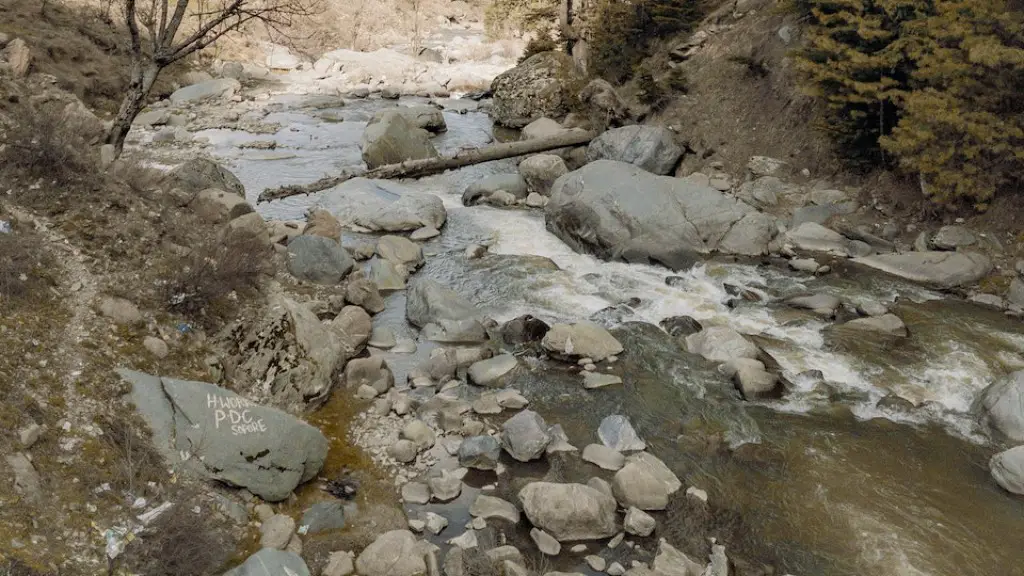In 1682, French explorer Robert Cavelier de La Salle, also known as Sieur de La Salle, became the first person to travel from the Great Lakes region to the mouth of the Mississippi River. As a result, La Salle was the first to see the full length of the river and claim it for France. He was also the first to give the mighty river a name. He called it the ” Riviere Colbert de la Louisiane”, which translates to the Colbert River of Louisiana in English.
La Salle’s trip along the Mississippi was part of a larger mission. He was tasked with finding a waterway that would connect France to Spanish America, as well as a trade route between the French colonies on the east coast of North America and the Louisiana territory. Although La Salle ultimately failed in this mission and was killed at the Battle of Matagorda Bay in 1687, his exploration of the Mississippi River would have a lasting impact.
At the time of La Salle’s journey, the lower Mississippi River was home to numerous Native American tribes, and many of them were engaged in trade along the river. La Salle observed this, and he was the first European to make detailed notes about the landscape and the cultures of the people who lived along the river. These notes were critical in establishing a basis for French exploration and settlement in the region.
La Salle’s exploration of the Mississippi would prove to be crucial in France’s colonization of the Louisiana territory. The river was a major transport and trade route that linked France’s holdings on the east coast of North America to the growing Louisiana territory, and it provided the French with an essential way of connecting and controlling their settlements in the new world. Through the exploration of La Salle, France developed a greater understanding of the Mississippi River and was able to use it to its own advantage.
The legacy of La Salle’s exploration of the Mississippi River has remained strong to this day. Although the name of the river has changed since La Salle christened it “Riviere Colbert de la Louisiane”, his explorations greatly impacted the course of French and American history.
Impact on Trade
The Mississippi River was and continues to be a major trade route for both the United States and the world. Goods such as cotton and grain have been transported down the river for centuries, and during the height of the cotton trade in the 19th century, it was estimated that over 2 million bales of cotton were shipped down the Mississippi every year. This made the river one of the most important trade routes in the United States and even the world. La Salle’s explorations of the Mississippi helped to open the region to trade and allowed the United States to develop a position of economic strength in the region.
La Salle’s journey helped to alert French authorities to the potential of the Mississippi River as a major transportation route. This understanding of the river’s potential made it easier for the French to develop trade routes and to build settlements along the river. La Salle’s explorations laid the groundwork for these later developments and opened the way for the river to be used as a major trade route for the United States.
The Mississippi River is still used for trade today, and it remains an important route for the transport of goods and services. La Salle’s explorations of the river made it easier to develop and maintain a strong trade network along the river, and this has helped to shape the economy of the United States.
Role in history
The exploration of the Mississippi River by La Salle also had an impact on the history of the region. La Salle was the first European to travel the length of the Mississippi, and he discovered and documented many of the tribes and settlements along the river. This laid the groundwork for further French exploration and settlement of the Louisiana territory, as well as the eventual United States expansion of the region.
The Louisiana Purchase of 1803 was an attempt by the United States to acquire the vast Louisiana territory from France. The United States was inspired in part by La Salle’s explorations and used his documents and observations to determine the nature and potential of the Louisiana territory. La Salle’s explorations made the Louisiana Purchase possible and had a major impact on the history of the United States.
The exploration of the Mississippi River by La Salle played a major role in the history of the United States. His explorations helped to lay the groundwork for United States expansion and helped to open the region to trade. La Salle’s explorations also helped the United States to gain a better understanding of the potential of the region, which made the Louisiana Purchase possible. La Salle’s exploration of the Mississippi has had an immense impact on the history of the United States.
Influence on Music
The exploration of the Mississippi River also had an impact on the music of the region. Blues music is one of the most influential genres of music in the United States and is often associated with the Mississippi River. This genre emerged from the African American communities along the river in the early 20th century, and La Salle’s exploration helped to lay the groundwork for their development.
La Salle’s exploration of the Mississippi allowed for the development of the various African American communities along the river. This gave the African American community a chance to develop their culture and music, and they used the blues to express their feelings and emotions. The influence of La Salle’s explorations on the development of the blues can still be felt to this day.
The exploration of the Mississippi River by La Salle had an immense impact on the culture of the region. His explorations helped to open the region to trade, which gave the African American communities along the river the opportunity to develop and prosper. This opportunity allowed them to create a new genre of music known as the blues, and this genre has since played an important role in the history and culture of the United States.
Conclusion
The exploration of the Mississippi River by La Salle was a major event in American and French history. La Salle was the first European to see the full length of the river and claim it for France. His exploration had an immense impact on the region and opened the way for French settlement and exploration of the Louisiana territory. La Salle’s exploration also had an influence on the music of the region and helped to create a new genre of music known as the blues. La Salle’s explorations have had a lasting impact on the United States and remain a vital part of its history.



